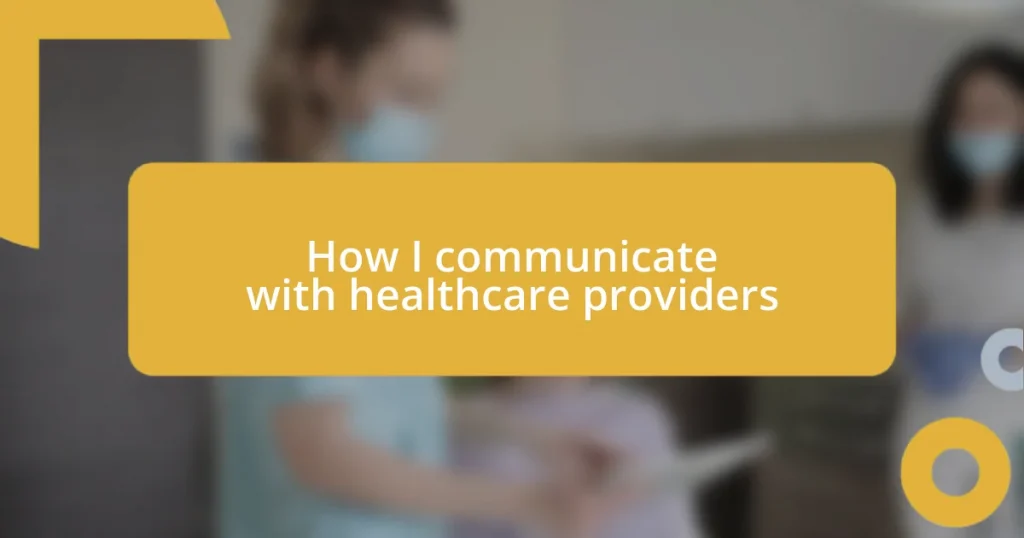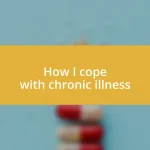Key takeaways:
- Effective healthcare communication requires clarity, empathy, and active listening to build trust and foster understanding between patients and providers.
- Asking the right questions and sharing relevant health information empowers patients to take an active role in their healthcare decisions.
- Following up after appointments enhances continuity of care and allows for better management of health conditions through ongoing communication and data sharing.
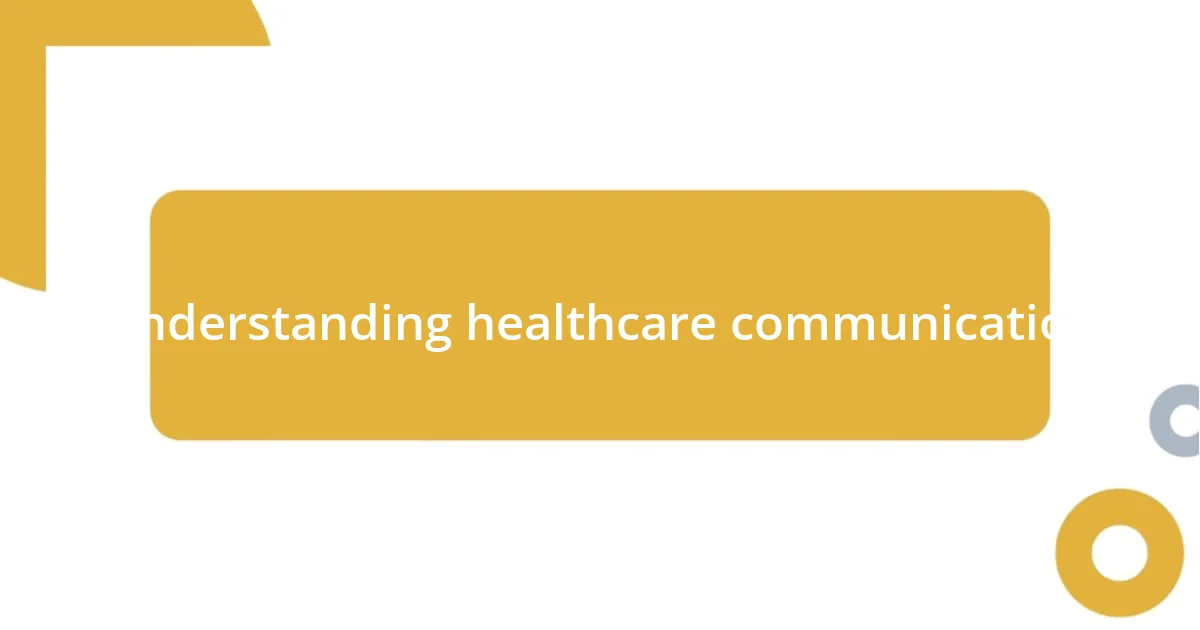
Understanding healthcare communication
Effective communication in healthcare is an intricate web where clarity and empathy intersect. I remember a time when I felt overwhelmed during a doctor’s visit. The doctor’s ability to explain my condition in layman’s terms and actively listen to my concerns made all the difference—did you ever notice how much smoother a conversation flows when both parties truly engage?
Understanding the nuances of healthcare communication involves recognizing that it’s not just about exchanging information. When I had a family member with a chronic illness, I learned firsthand that providers need to meet patients where they are emotionally. It’s important to consider how a patient’s emotional state can influence their understanding; can you recall a moment when you wished a healthcare provider had been more sensitive?
The tone and context in which information is delivered can either build trust or create barriers. I once encountered a physician who, despite having excellent knowledge, used unfamiliar jargon and a rushed approach. It left me feeling confused and unheard. Have you felt similarly in a healthcare setting? It’s crucial to remember that every conversation is an opportunity to foster a relationship built on trust and understanding.
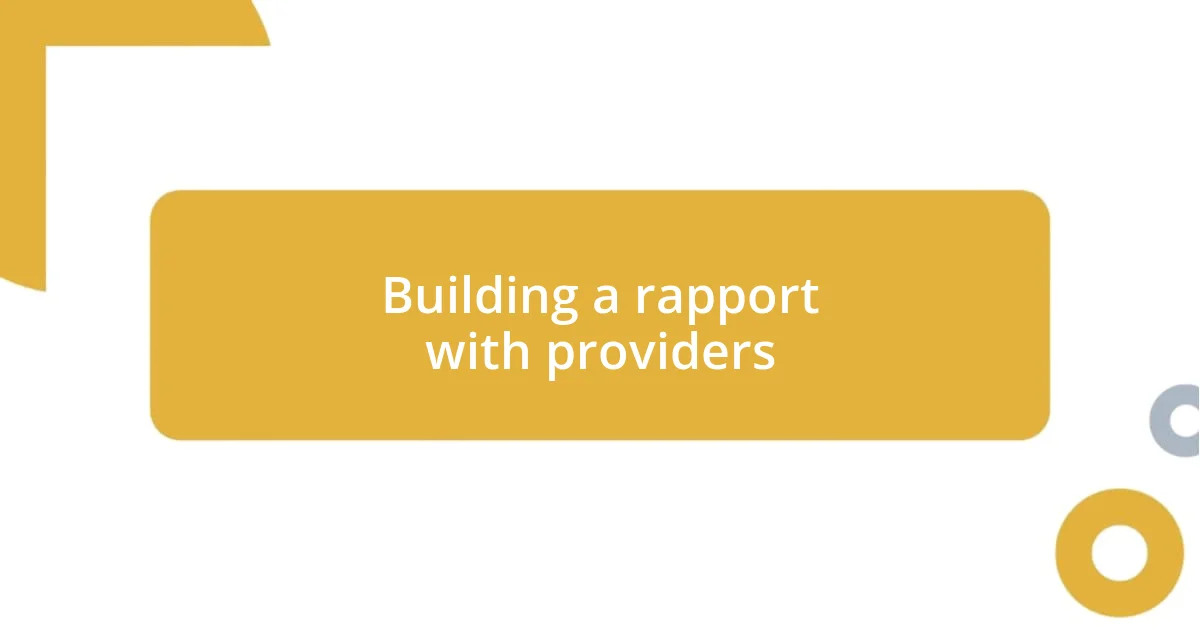
Building a rapport with providers
Building a rapport with healthcare providers often starts with small, intentional gestures. I’ve found that a simple smile and a “hello” can set a positive tone for the entire appointment. Once, while waiting for a specialist, I took a moment to chat with the nurse about her day. That brief conversation broke the ice and made me feel more comfortable sharing my concerns with the doctor.
Here are a few strategies that have worked for me in building rapport:
- Show genuine interest: Ask the provider about their experience or how they got into their field; it encourages them to open up as well.
- Be honest about your feelings: If you’re nervous or upset, letting the provider know can help them approach the conversation with more empathy.
- Follow up on previous discussions: Mentioning a past conversation shows I value their input and helps establish continuity in our relationship.
- Maintain eye contact: This simple act fosters trust and shows that you’re genuinely engaged in the dialogue.
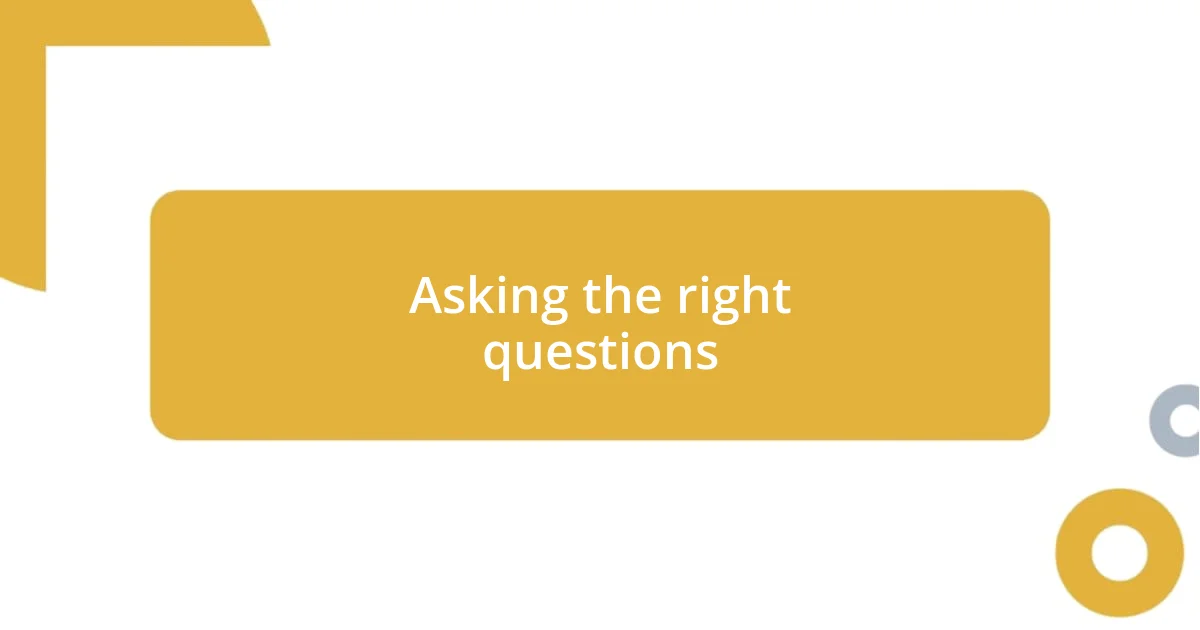
Asking the right questions
When I approach a healthcare appointment, I’ve realized that asking the right questions can truly empower me as a patient. One time, I prepared a list of specific questions related to my symptoms, which helped me take control of the conversation. Instead of passively receiving information, I engaged the doctor, which not only clarified my doubts but also revealed the importance of understanding all aspects of my treatment. Isn’t it refreshing to feel that you’re a part of the decision-making process?
There are different types of questions that can significantly enhance communication. For example, open-ended questions, like “Can you explain how this treatment will affect my daily life?” invite detailed responses, allowing me to grasp complex information. In contrast, closed questions, such as “Is this medication necessary?” yield straightforward answers but might miss the nuances. Learning to balance these question types has been a game changer for me—how about you?
Moreover, timing can make a world of difference when asking questions. I’ve learned that bringing up my queries early in the appointment allows for a more relaxed discussion. On one occasion, I hesitated and saved my questions for the end, which felt rushed. The physician was pressed for time, and I left feeling less informed. Have you ever found yourself wishing you had spoken up sooner?
| Type of Question | Example |
|---|---|
| Open-Ended | “How will this treatment change my lifestyle?” |
| Closed | “Is this medication effective?” |
| Clarifying | “Can you elaborate on why that’s important?” |
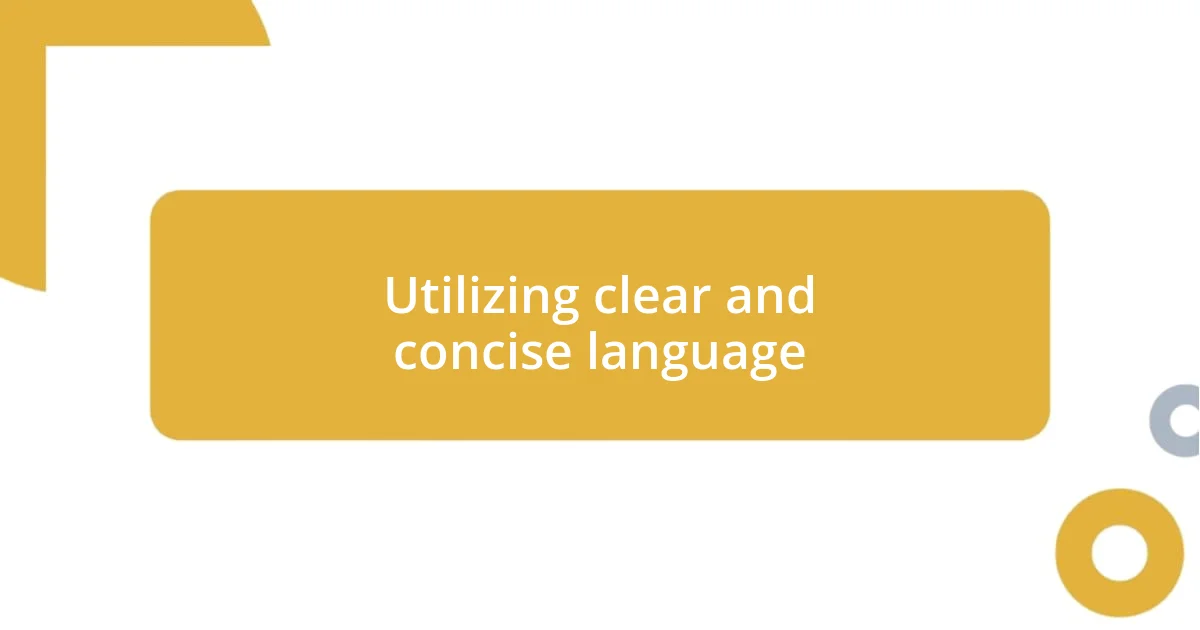
Utilizing clear and concise language
Utilizing clear and concise language in my conversations with healthcare providers has transformed my experience. I remember a particular visit where I distilled my symptoms into a simple sentence: “I’ve been having sharp pains in my side and fatigue.” This clarity not only made it easier for the doctor to understand my situation, but it also streamlined the conversation. Have you ever felt frustrated when a provider seemed confused by what you were saying?
Moreover, I strive to avoid medical jargon when speaking with my healthcare team. Once, I attempted to describe a condition using terms I heard online, and it led to a misunderstanding about my diagnosis. By switching to layman’s terms—like saying, “I have trouble breathing sometimes”—I noticed the doctor’s expression change. Suddenly, everything became clearer. This experience taught me that simplicity is powerful.
Sometimes, I reflect on the difference that brevity can make. I try to summarize my experiences in just a few sentences, focusing on the most relevant details. This technique not only respects the provider’s time but also maximizes my own understanding of the discussion. Have you experienced the relief that comes with knowing exactly what to communicate?
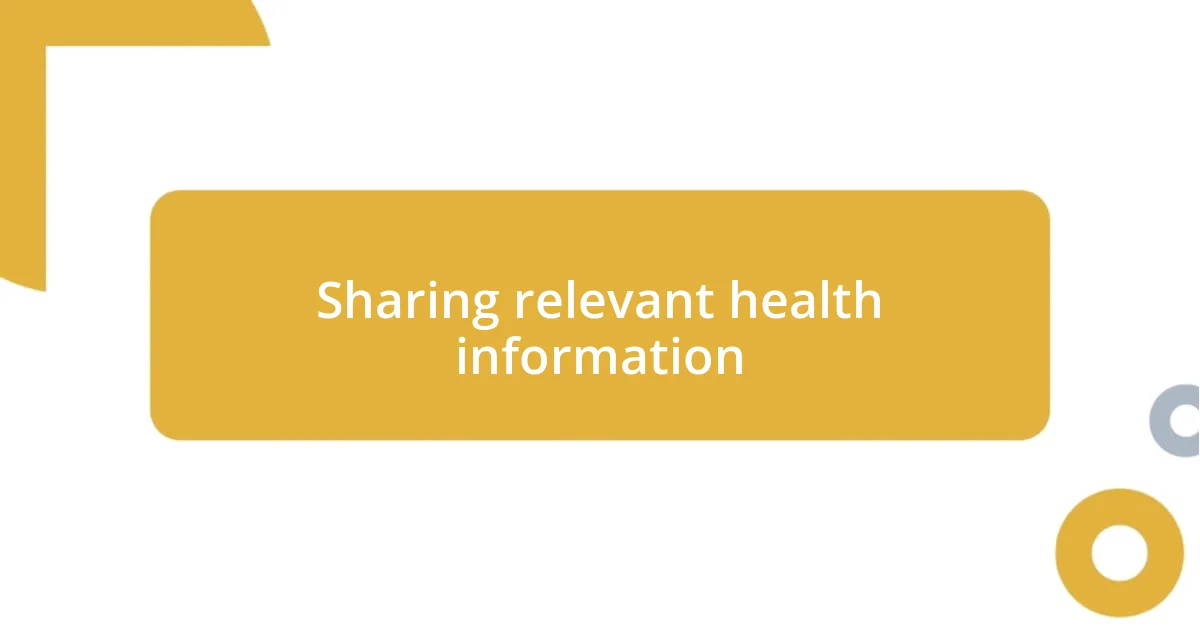
Sharing relevant health information
Sharing relevant health information is crucial for effective communication with healthcare providers. I’ve found that being mindful about what details to share can profoundly impact my care. For instance, during a check-up, I mentioned a recent weight loss that I initially dismissed as insignificant. To my surprise, my doctor connected that dot to a possible underlying issue. It made me realize how every piece of information matters—have you ever overlooked something you thought was trivial?
Another important aspect is organizing my health history before the appointment. I often write down medications, allergies, and past medical conditions in chronological order. This practice not only helps me provide clear context but also allows the provider to grasp my overall health picture quickly. One time, this preparation helped catch an interaction my doctor wasn’t aware of, potentially preventing a serious issue. Isn’t it empowering to know you’ve played a part in your own health journey?
Lastly, I always make it a point to update my provider on any lifestyle changes, such as diet or exercise routines. I remember sharing with my physician that I started a new workout regimen, which led to a discussion about adjusting my medications. It was interesting to see how interconnected our conversations became. Have you noticed how these small conversations can lead to significant adjustments in your treatment plan?
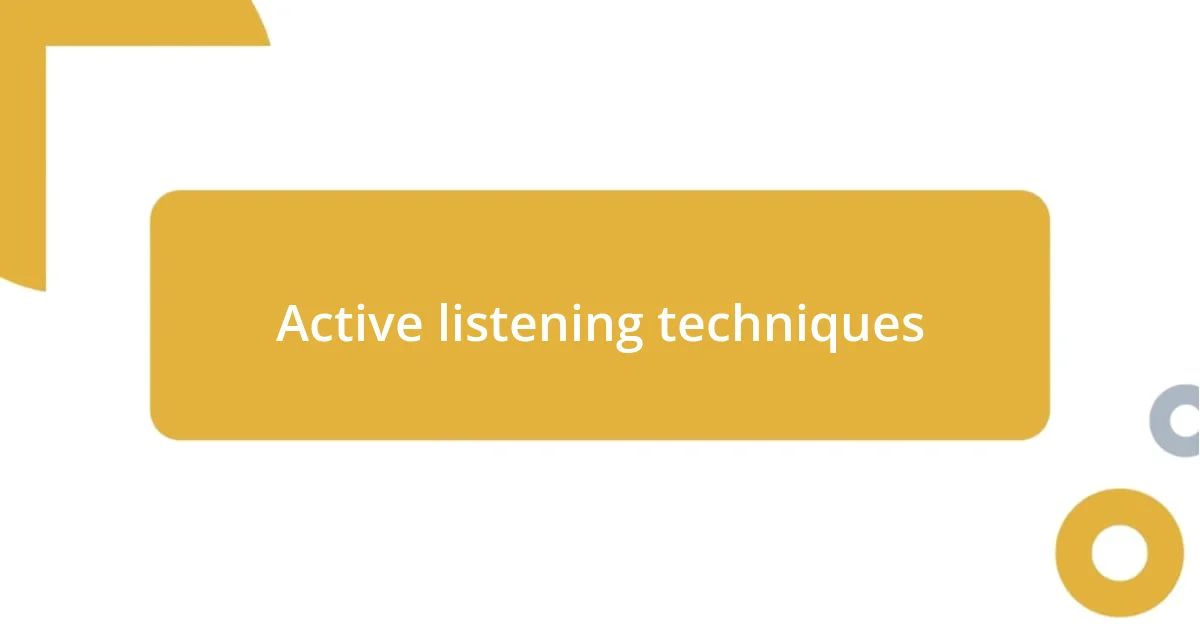
Active listening techniques
Active listening techniques are essential in fostering productive communication with healthcare providers. One technique I find invaluable is giving full attention. I make it a point to put my phone away and maintain eye contact during consultations. There was a time when I noticed my doctor glancing at notes while I spoke, and it struck me that I should invite their focus back to me by asking, “Do you need me to clarify anything?” This simple question not only engaged them but also reinforced my commitment to the conversation.
I also practice repeating back what I’ve heard to ensure understanding. During one visit, after explaining some symptoms, I said, “So what you’re suggesting is…” to confirm our discussion. It felt empowering to articulate my understanding of the situation while simultaneously encouraging my doctor to share more insights. This not only cleared any doubts but also reinforced the collaborative nature of our conversation. Have you ever had a moment where summarizing what someone said led to greater clarity?
Another technique that works for me is using empathetic validation. When my doctor mentioned a potential diagnosis that sounded overwhelming, I responded by acknowledging their perspective, saying, “That sounds concerning.” This moment of shared understanding not only eased the tension but also created a space where I felt comfortable asking further questions. Have you ever felt that a little empathy could transform an interaction with a provider? It’s remarkable how these small adjustments in listening can create a more positive dialogue.
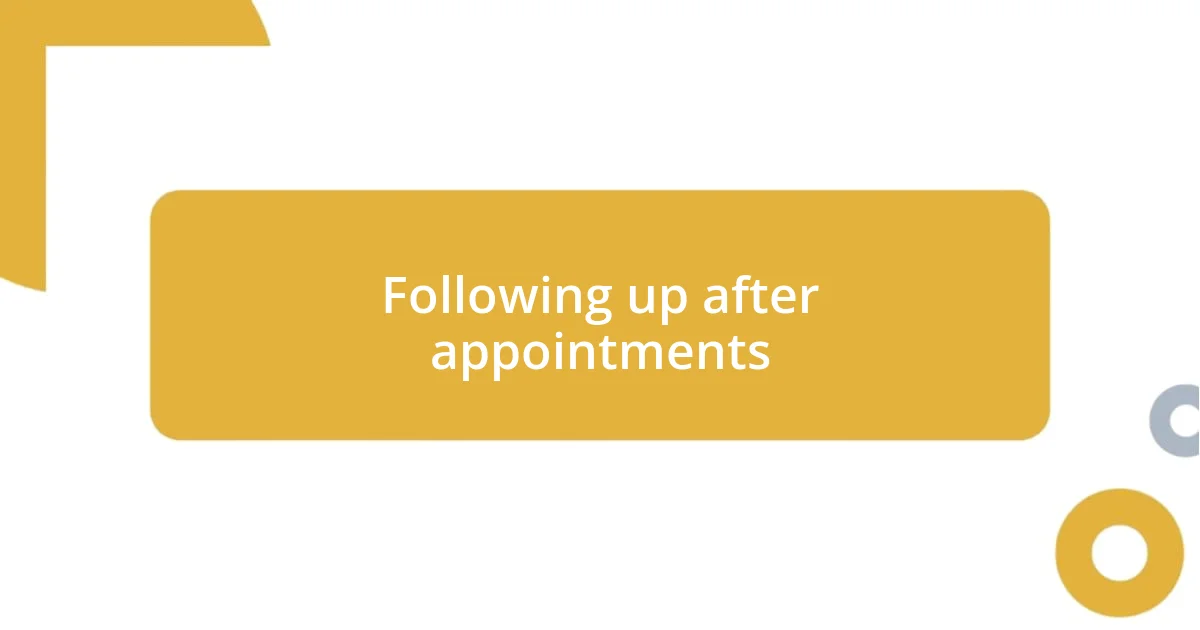
Following up after appointments
Following up after appointments is an essential step in ensuring continuity of care. I’ve found that sending a quick message or email to my healthcare provider after an appointment often highlights lingering questions I might have forgotten to ask during our chat. There was a time I felt uncertain about a prescribed treatment; reaching out for clarification led to a more tailored approach to my health that I might have missed otherwise. Have you ever felt that nagging question pop up later, only to wish you had addressed it sooner?
Sometimes, I take the initiative to monitor my symptoms and share any changes in my condition with my doctor even before our next scheduled visit. For instance, after a recent appointment regarding my migraines, I began a daily log that tracked my triggers and severity. When I followed up with my doctor a couple of weeks later, I could share concrete data that helped both of us understand the effectiveness of a new medication. This commitment to follow-up not only equipped my provider with valuable information but also fostered a sense of teamwork—how do you keep track of your health in between appointments?
Moreover, I make it a point to keep an eye on test results and treatment progress. Once, after a blood test confirmed my concerns about vitamin levels, I proactively reached out to discuss dietary changes. My healthcare provider appreciated my initiative and we crafted a plan that felt empowering to me. This experience reinforced the idea that following up is not just a duty; it’s an opportunity to engage actively in my health journey. What steps do you take to stay informed and involved after your medical visits?










